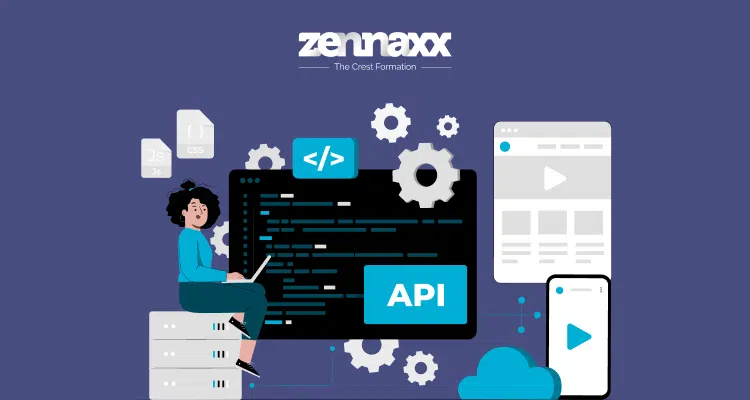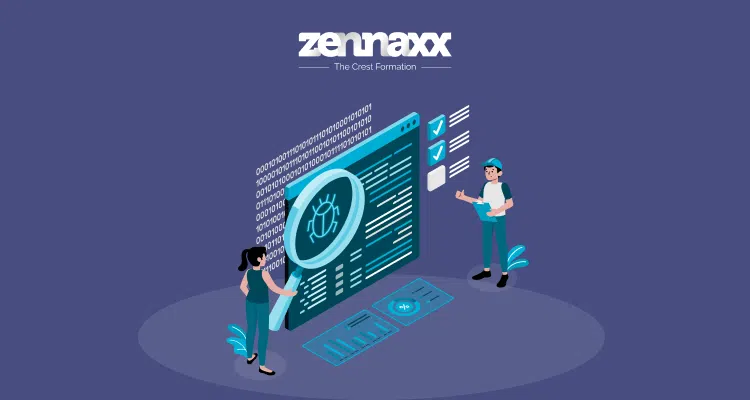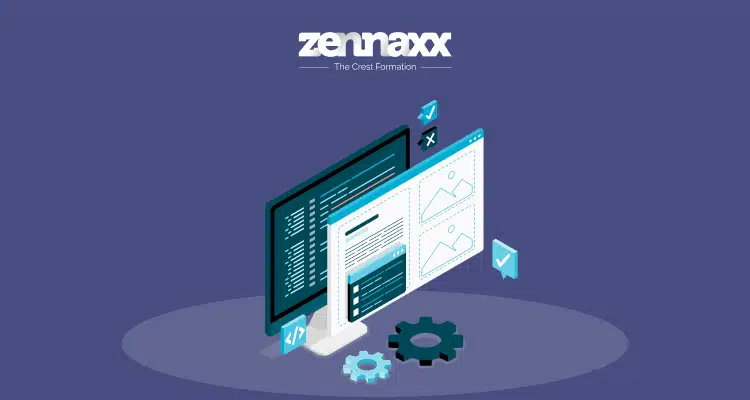Online buying is now etched in the human psyche and has become synonymous with “convenience.” You can buy almost everything online these days, which is why more and more businesses are looking to go online.
The global eCommerce market is set to reach $53.27 trillion by 2032, growing at a CAGR of 14%. So it does make sense to build an eCommerce website for your business.
However, a major concern is the cost if you are a brick-and-mortar store looking to digitize your business.
Yes, eCommerce website costs can be higher if you don’t plan well. However, most businesses fail to comprehend how to manage this cost.
What are the components of eCommerce development cost, and how can you reduce it?
This article will give you all the answers needed to calculate the eCommerce website costs.

Benefits of Investing in ECommerce Website Development
Investing in eCommerce website development can bring several business benefits. Some key business benefits of eCommerce website development are:
- Admin capabilities: Spring comes with features and tools that make managing and administering applications easier.
- Properties files: It allows the use of properties files for easy configuration and management of application settings.
- Type-safe configuration: Spring supports type-safe configuration, enabling developers to configure applications more intuitively.
- Web development: The framework offers a comprehensive toolkit for building web applications.
- Application listeners and events: Spring supports event-driven architecture, allowing developers to create applications that respond to events.
Things to Consider Before Creating an Ecommerce Website
Whether you want to build a t-shirt eCommerce brand offering cool prints for your customers or simply create an online thrift store, multiple factors contribute to your success.
These include the type of online store you need for your business, products, and budget.
1. What type of online store are you expecting to have?
Choosing which type of online store to develop depends on the target market, products, and business model. Some of the types that you can consider for your online eCommerce store are,
- Individual brand websites are online stores that sell products from a single manufacturer or service provider.
- Online eCommerce or retail stores that bring together multiple vendors on the platform for users to connect and transact.
- Niche market stores focus on selling specific products in categories such as pet supplies, groceries, and men’s grooming products.
- Online subscription stores provide recurring product deliveries to customers who subscribe to specific services or products like beauty boxes.
- Digital product stores allow you to sell online assets like apps, ebooks, music, and software.
- Services stores help you sell access to online services like freelance marketplaces, courses, and travel bookings.
Which online stores you want to develop depends on how you sell your product or service—“Online or Offline.”
2. Do you plan to sell your products online? Or do you already have a brick-and-mortar store?
Whether or not you plan to build an online store business from scratch impacts ecommerce website cost.
Logistics constraints and operational obstacles are reduced if you already have a brick-and-mortar business and want to digitize it.
This means you will focus more on building the eCommerce online store rather than overseeing the entire operation, including offline activities.
For example, your procurement is sorted if you are a T-shirt printing business with a brick-and-mortar retail store.
But you are a 100% online eCommerce store offering customers print-on-demand t-shirts.
In that case, you need to manage everything from procurement of raw materials to finding vendors and handling online listings.
This means you will have budget constraints that affect eCommerce website costs.
3. What is your ecommerce development budget?
Every organization spends more than half of its project budget on development activities. This is why you need an eCommerce development budget.
ECommerce development costs depend on factors like the complexity of features, project scope, stacks required, and specific business goals.
Here is a breakdown of your expected expenses for each aspect of eCommerce websites:
- Development costs, including front-end, back-end, and third-party integrations, contribute heavily to the cost of an eCommerce website. Ecommerce development costs can reach $135,000 or more.
- The website design budget will include the cost of creating responsive designs and custom graphic visuals.
- Integration of payment gateways , inventory management, and other essential functionalities also need fund allocation.
- Testing costs of eCommerce websites also contribute to the overall costs.
- Ensuring mobile responsiveness can cost you a UX in the range of $2000 to $30000.
- Marketing costs also contribute to the eCommerce website cost, which includes PPC advertising, copywriting, SEO, and other services.
This is just an overview of the breakdown, but other factors must be considered. For example, what shipping options do you offer for your eCommerce business? These do affect the cost.
4. What are your shipping options?
If you are setting up an eCommerce online store, you must consider how you will ship goods to customers. It takes some time to determine if you can fulfill shipping requirements.
Would you instead hire someone else to do the shipping or do it yourself?
Also, should customers worldwide be able to buy from your site?
You decide what you can do. But you need to consider its cost! Shipping adds to the already costly development cost.
Which option you choose for shipping does impact the cost of an eCommerce website.
Transform your business with web development
Zennaxx, a leading software development firm in Canada, has delivered 700+ bespoke solutions spanning various industries.
How Do You Calculate Ecommerce Costs?
Setting up an eCommerce website can be costly, with expenses varying based on many factors. Launching an eCommerce store can range anywhere from a hundred to a hundred thousand dollars. But all of it boils down to the below factors.
1. Infrastructure Costs
Creating an internet shop requires incorporating aspects related to expenses.
Now let’s delve into these factors,
Software costs
The pricing of eCommerce solutions can differ based on their features, service offerings, and software categories. Selecting the platform is vital when starting a store.
Below are some eCommerce platforms to consider.
BigCommerce
BigCommerce stands out as an eCommerce platform recognized for its easy-to-use interface and faster setup.
Its user-friendly layout empowers newcomers to craft visually appealing websites. You can also leverage efficient shop pages from BigCommerce to streamline product showcasing and order handling.
The headless options from BigCommerce offer businesses versatility. It allows integration with CMS and other systems for advanced capabilities.
Magento
Magento is a reliable and feature-rich platform that offers both on-premise software and externally hosted solutions.
It supports the ability to tailor and customize it entirely, but technical expertise is a requirement with Magento.
Magento has a steep learning curve, and being flexible may challenge less seasoned users. It requires significant effort and knowledge from experienced users to manage Magento.
Shopify
Shopify stands out among the other eCommerce solutions with a simple interface and drag-and-drop functionality.
It is an ideal option for beginners. However, as businesses advance and need more sophisticated features, BigCommerce may be a better choice.
Shopify development allows you to set up a simple website quickly, but you may need additional coding or integration of third-party apps for advanced functions.
2. Domain name costs
One of the most common eCommerce website costs is domain name registration.
Renewing a domain name is a recurring annual expense, about $2-20 per year. It is paramount to keep track of your costs as your business expands.
Domain renewals are one steady fee you need to consider. Include this and other operating costs like transaction fees, subscriptions, storage of your inventory, and fulfillment.
Here are some of the critical domain name registration services and their prices.
3. Ecommerce hosting
Now that your domain name is locked down, it’s time to decide on a website host. Finding a hosting service provider is crucial if you want total control over your hosting environment.
Depending on a hosting service’s traffic and technical needs, you must pay $80 to $730 or more.
More bandwidth, backups, and security features can add up to the cost of an eCommerce website. Not to mention the time spent maintaining the server.
4. SSL certificate costs
SSL certificates are your security haven! It helps you secure the communication between your website server and the browser.
You can buy SSL certificates from the leading certificate authority(CA) by creating a certificate signing request(CSR).
This CSR will have all the details of your organization, which CA will verify to issue an SSL certificate, which you can install on your eCommerce website. An SSL certificate can cost you $20-$70 per year.
5. Payment processing costs
When setting up payment processing for your eCommerce business, you must consider the costs: the various payment gateway options, transaction fees, and additional charges affect your bottom line.
Some factors considered while choosing a payment gateway include transaction fees, additional fees, currency and region support, and conversion rates.
ECommerce businesses can optimize their payment processing expenses and improve their bottom line by carefully reviewing the payment gateway options and associated costs.
2. ECommece Website Costs Based on Developer type
Developer-based costing depends on many factors, including experience, developer skill set, and what type of engagement model you choose.
Outsourcing companies and freelance developers use different models to offer development services, including hourly, monthly, and fixed costs.
Another essential factor to consider is how you plan to use the developers. For example, hiring developers is redundant if you plan to make a DIY eCommerce website, and you will need an all-in-one platform like Shopify.
Hiring an eCommerce website developer to freelance can be cost-effective, but specific limitations exist.
A significant limitation of hiding freelancers is the need for more quality control. Freelancers may be working on multiple projects, which can lead to divided attention on your projects.
However, considering the pricing, a freelancer can cost you $10,000 to $50,000 or even more. On the contrary, you can leverage an eCommerce web development agency for comprehensive services.
From design, development, and deployment, these agencies offer services costing you between $15,000 and $3,50,000.
3. Size of the website
Prices for an eCommerce website differ according to its extent and complexity. This means you spend less if the website is small but more when complex features exist, and you can expect higher costs.
Small websites typically cost between $1,000 and $10,000. Medium eCommerce websites cost between $10k and $50k. The cost can increase to $50k and above for more complex and large websites.
You can calculate the total costs using website cost calculators such as Shopify, Bigcommerce, Wix, or Squarespace.
These calculators leverage several parameters to calculate eCommerce website costs, including product catalog, specific features, and traffic level.
4. Type of design and development
The cost of developing an eCommerce website can vary significantly depending on the type of design and development required.
Options include using pre-designed themes and plugins or opting for custom development.
If you use pre-designed themes and plugins, the cost can range from $5,000 to $1,50,000. It includes a pre-designed theme with customization and the integration of various plugins for additional functionality.
On the other hand, if you choose custom eCommerce website development, the cost can range from $1,500 to $20,00,000 or more.
The price depends on the complexity of the design and functionality required.
5. ECommerce Platform Cost
Shopify, Magento, and WooCommerce are eCommerce platforms with various price levels. Prices could be as low as $30/month for an essential service.
More complex services from these platforms cost more. Here is the price range for Shopify and BigCommerce
- Shopify- 29−299 per month
- BigCommerce- 29.95−299.95 per month
6. Customization Cost
Customization involves tailoring the eCommerce site to meet specific functional requirements.
This includes theme customizations, features, and unique integrations to add advanced functionality to your eCommerce website.
For example, you can integrate third-party apps to enable multi-language support on your eCommerce website.
Basic customizations cost between $1000 and $10,000, but advanced customizations cost up to $30,000 or higher.

7. Payment Gateway Integration
Online eCommerce stores can use payment gateways to securely process payments. There are also costs included in the account setup fee and fees charged per transaction.
Each provider differs in what they charge for setup fees, as it can be between $0-$500.
Usually these make up between one and 3.5% rate commissions. They might also provide instruments to perform settlements and payments themselves.
8. Content Creation Cost
Copywriting plays a vital role in developing content for eCommerce websites.
Copywriters craft product descriptions, advertising, and marketing copy to capture attention and convince clients to take desired actions.
Product descriptions provide targeted information about merchandise, helping clients make informed decisions.
Blog posts offer valuable insights, educate readers, and establish thought management. Marketing copies promote products or services on your eCommerce website.
The cost of copywriting offerings varies depending on content type, duration, and complexity. Apart from copywriting, you must also invest in creating graphics and visuals for your website.
Prices for copywriting and graphics creation can vary across service providers.
9. Third-party integrations
Third-party integrations for eCommerce website development can vary depending on the complexity of the services you want to integrate.
For example, if you are integrating AI-based technology into your website, it will cost more.
Third-party integrations can cost from $20,000 to $25,000, and some services may even begin at $1,000.
Such integrations can be plugins, app extensions, or third-party applications that help add functionalities to the eCommerce website.
10. Mobile Responsiveness Cost
Mobile traffic is one of the major contributors to your eCommerce platform’s overall visitor count. Statista reports that half of web traffic comes from mobile, making smartphone responsiveness a key aspect.
Your eCommerce website needs to be mobile-friendly and designed to provide a consistent experience across devices.

Ensuring a mobile-responsive website can cost you between $500 and $2,000. When you already have an existing site.
But for a basic blog or portfolio site, the cost of mobile responsive designs ranges from $300 to $500.
11. SEO Optimization Costs
SEO optimization for an eCommerce website enables businesses to improve visibility and conversions. It includes the implementation of different strategies that will improve organic search rankings for your eCommerce website.
You can optimize SEO by ensuring product images added are relevant to keywords along with title tags, meta descriptions, and well designed sites.
ECommerce SEO costs vary based on the service provider, location, target audience, and specific requirements.
Prices for eCommerce SEO range from $750 to $5000 monthly for most small-to-mid-sized businesses.
However one-time projects cost between $1000 to $30,000. ECommerce SEO consultants’ hourly rates range from $100 to $300 per hour.
Ready to Build Your Online Store?
Let’s Create Something Amazing Together with Our E-commerce Development Services!
12. Maintenance and Support costs
Maintaining the performance of your eCommerce website is crucial to ensure there are no disruptions.
For example, if you sell limited edition shoes online and you decide to have an end-of-season sale to clear stocks, a poorly maintained website will not hold against massive traffic.
So, you need a well maintained eCommerce website and will have to spend on effective maintenance.
The cost of maintaining an eCommerce website depends on multiple factors, like the website’s size, the complexity of the platform, the number of integrations, and the level of security and performance required.
Here are some eCommerce website maintenance costs:
1. Small eCommerce websites
- Website maintenance: $250-$500 per month
- Security and protection: $0-$100 per month
- File and database backups: $0-$50 per month
2. Medium eCommerce websites
- Website maintenance: $500-$2,500 per month
- Security and protection: $0-$100 per month
- File and database backups: $0-$50 per month
3. Large eCommerce Websites
- Website maintenance: $2,500-$10,000+ per month
- Security and protection: $0-$100 per month
- File and database backups: $0-$50 per month
4. Enterprise eCommerce websites
- Website maintenance: $600-$1,000 per month
- Security and protection: $0-$100 per month
- File and database backups: $0-$50 per month
Conclusion
Building an eCommerce website can be costly because it has several components, including design, maintenance, SEO, etc.
The cost of each component adds to your eCommerce website costs, and you need to strategize the entire development process.
You also need to factor in the costs of domain name registrations, security costs, and expenses of creating a mobile responsive site.
However, you need a reliable eCommerce development partner to optimize costs and create a high-performance site for your business.
Zennaxx can help you build such eCommerce websites at minimal cost. Get an estimate now of your eCommerce website cost.








